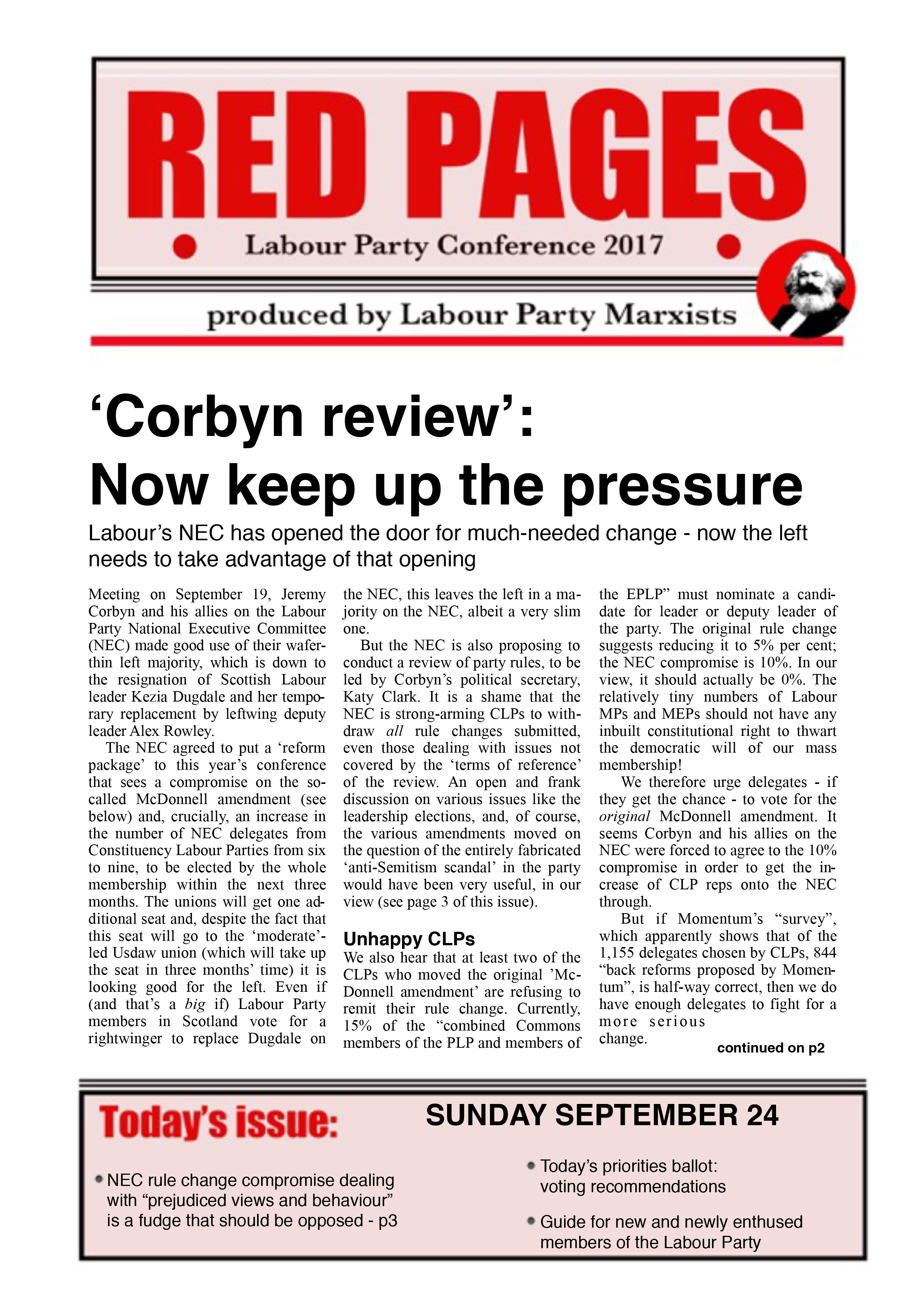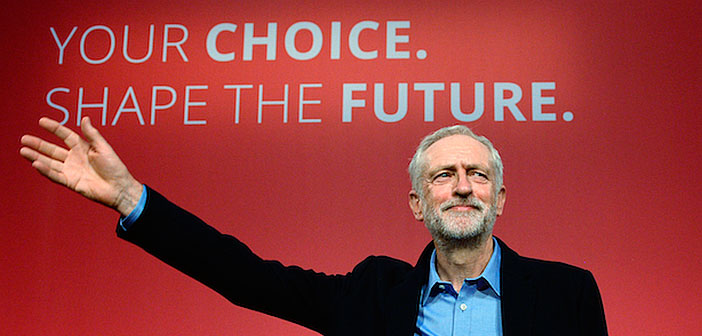June 8 was a disaster for Theresa May and a triumph for Jeremy Corbyn. Marxists need to explain how it happened and map out how our labour movement can take further steps forward.
1. The results of the June 8 general election were almost without exception excellent from our viewpoint. The Tory share of the vote was 42.4%. Humiliatingly though, they lost 13 seats. Labour’s share of the vote rose to 40% and saw it gain 30 seats. No less positive, the Scottish National Party suffered a significant setback. They are down by 21 seats. True, as we have long warned, there was an always present danger of a Tory rebirth north of the border. Ruth Davidson now has 13-strong group of Scottish MPs. But Labour is back too. Having been reduced to a single MP, Labour now holds seven seats in Scotland’s central belt. Those on the left who pathetically trail the SNP – eg, Socialist Workers Party, Socialist Resistance, Scottish Socialist Party, etc, and wanted to “make” June 8 an “independence election” – have had their answer. And in Wales, instead of the Tories gaining, it was Labour.
2. With good reason we can say that there is a return to two-party politics. Not that it ever really went away. Capitalism, the existence of two main classes, the first-past-the-post system, all tend to produce two great camps: one of capital, the other of labour.
3. What of the other parties? The Liberal Democrats were well placed to hoover up discontented remainers because of their manifesto promise to oppose Brexit and the offer of a second referendum. True, they gained four seats. However, their share of the vote fell to just 7.4%, an all-time low. An additional bonus: Nick Clegg lost in Sheffield Hallam – the final coda to the Cleggmania that swept the country just before the 2010 general election.
The UK Independence Party now looks to be heading the same direction as the British National Party. And it was not Stand Up To Racism that was responsible – Theresa May stole their programme. This helps to explain why the Tories could increase their overall total vote to 13.6 million. Nevertheless, especially in the north of England Labour too benefited from Ukip’s collapse. Northern Ireland’s politics are ever more polarised. The Democratic Unionist Party gained two seats, as did Sinn Féin. In parliamentary terms the official Ulster Unionist Party and the Social Democratic Labour Party suffered complete wipe-out.
4. Was June 8 a second EU referendum? Was it chiefly about Europe and Brexit? That is what pundits suggested when the general election was first called. And, obviously, that is what Theresa May and her Tory strategists intended. The same can be said of Paul Nuttall and Ukip, and Tim Farron and the Liberal Democrats. However, unless they could not help it, that was never going to be the case with Jeremy Corbyn and John McDonnell. Their position on the EU was, and is, deliberately equivocal. They campaigned ‘remain’ in 2016, now they say they respect the 52%-48% ‘leave’ vote. Moreover, they want a Brexit that protects British jobs and British industries, while simultaneously making noises about reducing the flow of labour from abroad. A classic left-nationalist fudge.
5. Lord Ashcroft’s analysis of the general election is revealing. Six out of 10 of those who voted ‘leave’ in 2016 voted Tory this time. Only 25% of them voted Labour. Meanwhile, amongst ‘remainers’ 25% voted Tory, 51% Labour and 24% Liberal Democrat. In other words, in terms of electoral base the Conservative Party is solidly pro-Brexit, that of the Labour Party and Liberal Democrats is opposed to Brexit. Certainly, taken as a whole, this bloc has no wish to see a hard Brexit. That said, when it comes to reasons for voting, while Tory and Lib Dem voters rated Europe as their key issue, Labour voters were much more likely to be motivated by education spending, NHS cuts, student grants, poor housing, low wages and opposing foreign intervention. Given how well Labour actually did, certainly when it came to poll predictions, it is clear that June 8 was not a Brexit election.
6. Arguably June 8 was a generational election. The figures are startling. Of those aged 18-24, a massive 66% went with Labour, a mere 18% with the Tories. And this cohort came out in record numbers, many for the first time. But when it comes to the over-65s, the picture almost reverses: 58% Tory, only 23% Labour. What this reflects, however, is not a generational war: rather class retrogression – the proletarianisation, the de-petty-bourgeoisification of the younger generation. They might be attending university, or already have graduated. But they come out of full-time education burdened with huge debts, and then they can only secure precarious or comparatively low-paid jobs. As for the dream of home ownership, it is likely to remain just that: a dream. They have to stay with aged parents, pay exorbitant rents for tiny, often shared, flats. Sociologists insist on classifying them as middle class, but, of course, they are no such thing. They are working class. They have to get up in the morning and sell their labour-power. Even those who still aspire to make it into the middle class bitterly oppose the Tories, their austerity, their anti-migrant national chauvinism, their warmongering, their amorality and their worship of the market. Newly qualified teachers, junior doctors and young techies alike voted Labour in huge numbers. Corbyn excited them, inspired them, motivated them.
7. Ever since Jeremy Corbyn looked like he was going to win the Labour leadership contest in 2015, certainly since the Brexit vote and Theresa May as prime minister, Marxists arrived at five main conclusions. One, the Labour right would fight an unremitting civil war against Corbyn and the left; two, we had a once-in-a-lifetime chance to transform the Labour Party; three, there would be no hard Brexit; four, whatever May was saying about waiting till 2020 and the fixed-term parliament act, she would eat her words and call a snap election over Brexit; five, the Labour Party would come out of the general election badly defeated.
8. Like many, we were surprised by Labour’s strong showing. We expected that the ongoing attacks against Jeremy Corbyn by the pro-capitalist right in the Labour Party, aided by almost the entire bourgeois media, would lead to Labour receiving a trouncing in the ballot box. We feared a Tory landslide and that Labour reduced to a parliamentary rump would demoralise the hundreds of thousands who had joined or rejoined the Labour Party because of Jeremy Corbyn’s leadership. We warned that the strategic goal of transforming the Labour Party would, as a consequence, flounder. It seemed desirable to try and lower expectations in the short term with a view of securing the long-term goal. We are glad that our fears did not materialise.
9. Our fears were understandable. In the couple of weeks before June 8 polling companies were reporting that, while the gap between the two main parties had narrowed, it was still considerable. ComRes gave the Tories a 12% lead (down from 21% when the election call was first made). ORB put the Tories at 44% and Labour 38%. On the day of the election, Lord Ashcroft produced estimates giving a Tory majority ranging from 52 to 96. Given past performance in by-elections and the recent round of council elections, such figures appeared quite likely. Labour was also plagued by a rightwing anti-Corbyn campaign that amounted to out-and-out sabotage. Labour MPs habitually briefed against Corbyn, staged coordinated resignations and regularly demanded his resignation. Rank-and-file leftwingers were subject to vile charges of anti-Semitism, intimidation and even assault. Thousands were expelled or suspended. While, of course, no rightwing Labour MP actually wanted to lose their seat, without exception they expected Labour to do badly. Therefore “working the tearooms” and the renewed preparation of leadership bids. Yvette Cooper and Chuka Umunna were widely touted. So was Clive Lewis (thanks to Owen Jones).
10. Terrified by the prospect of an increased Tory majority, Jon Cruddas, Clive Lewis, Helena Kennedy, Hilary Wainright, Tulip Siddiq, etc pleaded for Labour to stand aside for the Greens in Brighton Pavilion and the Isle of Wight. In line with this, Compass – a “leftwing” pressure group once aligned with the Labour Party, but now uniting “people across different political parties (and those with no party affiliation)” – promoted its ‘Progressive Alliance’. This popular front involved tactical voting and Labour, the Lib Dems, Plaid, the SNP, the Women’s Equality Party and the Greens getting together to “co-create a new politics”.
11. Of course, there was no increased Tory majority. Nor was there a ‘Progressive Alliance’. Thanks to Tory blundering, May’s cowardice, Corbyn’s wonderfully successful town and city rallies, his more than competent media performances, the alternative Labour machine in the form of Momentum and a huge army of individual members canvassing and campaigning, not least by Facebooking, Tweeting and Snapchatting, Labour did remarkably well.
12. Nevertheless, by all accounts, the Labour surge took place with the finishing line already in sight. The general election became really interesting only in the closing weeks. According to Lord Ashcroft’s post-election analysis, unlike the Tory vote, Labour’s took some time to firm up: 57% decided to vote Labour in the last month, 26% in the “last few days” of the campaign.
13. And there has been another significant influx into the party. Tens of thousands have joined. It should be said, moreover, that the majority of them stand instinctively, albeit vaguely, to the left. They soaked up Labour’s policies from the social ether … and gave them their own take. Tory propaganda also had its own, altogether unintended, effect. Corbyn was denounced as a communist, a Marxist, a friend of extremism, an advocate of class war. The Tories repeatedly showed old pictures of him standing alongside Gerry Adams; they repeatedly showed old pictures of him speaking in Trafalgar Square in opposition to the Iraq war.
14. This hugely expensive media and advertising campaign totally backfired. Nowadays many people, especially the young, are looking for an alternative to capitalism. They no longer fear socialism. They positively yearn for radical solutions … and they are looking to Jeremy Corbyn to deliver.
15. The Tories attacked Corbyn for suggesting some causal link between what has happened to Muslims in the Middle East over the last couple of decades and Manchester, London and other recent examples of home-grown Islamic terrorism. Well, there is a link. That is not to excuse the bombings, the car attacks, the stabbings. It is merely to state the obvious … and served to bring attention to Tory cuts in police numbers in pursuit of their austerity agenda.
Moreover, the electorate was usefully reminded by the Toriesthat Corbyn was one of the tiny minority of MPs who consistently stood against the imperial interventions in Afghanistan, Iraq, Libya and Syria … and the hell on earth they created. Not only has the ‘war on terror’ cost the lives of “as many as two million people” (Physicians for Social Responsibility). The conditions were created for al-Qa’eda, Ansar al-Sharia, al-Nusra, Islamic State, etc. As for Gerry Adams, British ministers now regularly meet and greet him. Sinn Féin is integral to the constitutional arrangement put in place by the 1998 Good Friday agreement. As for being pictured alongside Gerry Adams, Charles Windsor, Bill Clinton, Nelson Mandela and Tony Blair have all posed for the world’s cameras, smiled and duly shook hands with the great peacemaker.
16. The general election greatly diminished Theresa May. She is a shadow of her former self. Her remaining time as prime minister is surely limited. Already her trusted aides, Nick Timothy and Fiona Hill, have been forced to fall on their swords. Leading rivals retain their ministerial posts and have demanded one token concession after another. The “confidence and supply” deal with Arlene Foster and her Democratic Unionist Party is a recipe for weak and unstable government. May’s allies are sectarian, bigoted, eccentric, crazed … and unreliable. Expect MPs to be transported to the Commons by ambulance. Expect desperate government bribes. Expect by-election defeats. Indeed, so slim is the government’s legislative majority, so fractured are the Tories, that what will happen in the Brexit negotiations is extraordinarily unpredictable.
17. The Brussels bureaucracy, the EU 27 – crucially Germany and France – will play hard ball. British negotiators will be treated with contempt. After all, Theresa May did not get the mandate she asked for. She was rebuffed, thwarted and punished by the British electorate on June 8. True, the Great Repeal Bill that parallels Brexit could be presented to parliament as a one-line motion. Politically, however, that is impossible. Meanwhile the two-year clock is already ticking away. The March 2017 vote on article 50 saw to that. Therefore, with an unprecedented mass of legislation to steer through parliament, in all probability Brexit will simply grind to a halt. Tellingly, both president Emmanuel Macron and the German finance minister, Wolfgang Schaüble, have recently put on record that the EU is “open” to a British change of heart.
18. Big business frets over the uncertainty. The June 23 2016 EU referendum came as a terrible shock for the core representatives of capital. Now they have the June 8 2017 general election. A double whammy. Note, Moody’s is already casting doubt over Britain’s stability and its Aa1 credit rating. Understandably, desperate voices are being raised calling for a “national unity government” made up of ministers from both main parties. Of course, as the Financial Times readily admits, in the “real world” it will not happen. Corbyn has no apparent appetite for a coalition and is obviously relishing the prospect of a decaying Conservative Party and outright victory in the next general election.
19. The fact of the matter is that Labour’s For the many, not the few manifesto, is only a tad to the left of Ed Miliband’s 2015 offering. Britain can be better promised a ban on “exploitative” zero-hours contracts, to “freeze energy bills”, “abolish non-dom status”, to “value” trade unions as an “essential force” in society, to “reduce tuition fees to £6,000” annually, invest in health and education, put in place a national rail body and encourage “public-sector operators”, build “at least” 200,000 homes, “cut the deficit every year”, “replace” the House of Lords with an elected “Senate of the Nations and Regions” and “build an economy that works for working people”.
20. For the many promised to eliminate the “government’s deficit on day-to-day spending within five years”, “invest in cutting-edge” industries and to “upgrade our economy”, bring back into “public ownership” the rails, establish “publicly-owned water companies”, no new “private prisons”, “regain” control over “energy supply networks”, “review laws on trade union recognition”, “repeal the trade union act”, “ban zero-hour contracts”, a programme to build a “million new homes”, a Britain “for the many, not the few”, etc.
21. In other words a pro-worker Keynesianism that was tried, tested and failed in France with the 1981-83 socialist-communist government under president François Mitterrand. Having begun with the mildly leftwing policies of the common programme, which were presented as a step in the direction of socialism, Mitterand presided over the so-called tournant de la rigueur (austerity turn) two year later. Capital went on strike, inflation shot up and French competiveness slumped. The fate of the Syriza government in Greece should also stand as a warning.
22. That For the many is in fact Mitterandist lite did not stop the economistic left going into rhapsodic overdrive. The manifesto was welcomed as “a socialist platform”, “a programme which would help begin the socialist transformation of Britain”, etc.
23. However, there was nothing socialist about For the many. For orthodox Marxism socialism begins with a fundamental break with capitalism – socialism being, the rule of the working class and the transition to a classless, stateless, moneyless society. But For the many does not even adhere to a reformist socialism … which holds out the prospect of ending capitalism though introducing socialism in one country at a time through piecemeal legislative change.
24. For the many accepts capitalism, does not mention socialism, wants to reconcile antagonistic classes. In fact, for those willing to see, there are many tell-tale formulations in For the many designed to appease the pro-capitalist right in the Labour Party. No wonder after the shock of June 8 one MP after another has gone to TV and radio studios to sing its praises. The opening section of For the many includes the revealing statement that Labour “will support businesses”. Big capital is given the assurance that a Corbyn Labour government will keep corporation tax “among the lowest of the major economies”. And then there is the pledge to “put small business at the centre of our industrial strategy”. We are furthermore told that Corbyn and McDonnell will set a “target” for “eliminating” the deficit “within five years”.
25. Indeed, sadly, it is worth noting that For the manyinternalises many aspects of Thatcherism. Take the programme for building a million homes. Nine tenths of them are projected to be private. Only a tenth council and housing association. A Corbynite take on the Tory ideal of the property-owning democracy: a cynical attempt to undermine working class consciousness by getting mortgage slaves to imagine themselves as little capitalists.
26. Nato membership goes unquestioned and there is the boast that the last Labour government “consistently” spent above the 2% benchmark. Indeed it is claimed that the Tories are putting “Britain’s security at risk” by “shrinking the army to its smallest size since the Napoleonic wars”. We are also told that the “scrapping of Nimrod, HMS Ark Royal and the Harrier jump-jets have weakened our defences and cost British taxpayers millions”. Unlike the Labour 1983 manifesto, For the many commits Labour not to a “non-nuclear defence policy”, but renewing the Trident missile system. Bizarrely, this is proposed in the name of fulfilling Britain’s “obligations” under the Nuclear Non-Proliferation Treaty. So building the next generation of SSBN submarines – together capable of obliterating 172 cities – is meant to be a step towards “a nuclear-free world”.
27. No genuine leftwinger, no genuine socialist, no genuine Marxist could possibly support For the many. Our motto remains: “For this system, not one man, not one penny” (Wilhelm Liebknecht speaking in the German Reichstag in 1871). The working class should, as a matter of elementary principle, oppose the standing army, not regret its reduced size. We are for a popular militia, not weapons of mass destruction.
28. Nor are socialists purveyors of the myth of Britain’s “long established democracy”. Britain’s quasi-democracy is in historic terms recently established. And every democratic advance has been won from below in the face of fierce opposition from above. Most male workers only got the vote in 1918. Women in the late 1920s. And, of course, the capitalist press, the media, the education system normally ensures that the electorate normally votes for safe, careerist, bribable candidates (eg, a clear majority of Labour’s 262 MPs elected on June 8). Moreover, the country is a monarchy, where the privy council, the secret service, the bureaucracy, the army high command and the judges can legally dispose of any unacceptable government. Yet For the many innocently proclaims that: “Democracy is founded upon the rule of law and judicial independence.” A classic liberal formulation. And, apart from calling for an elected second chamber, a “more federalised country” and a vague phrase about “inviting recommendations about extending democracy”, the existing constitutional order is accepted.
29. The same goes for capitalism. For the many believes that capitalism, the economic system, can be managed for the benefit of the many. It simply cannot be done. Capitalism is a system of exploitation based on the endless self-expansion of capital and generalised wage-slavery. Individual capitalists and top managers can have their dividends heavily taxed and their salaries capped. But capital has to expand through extracting surplus value from workers … without that capital will cease to be capital, stay as money, find its way abroad, etc. In fact, the “creation of wealth” is not, as For the many maintains, “a collective endeavour between workers, entrepreneurs, investors and government”. Wealth is created not by so-called entrepreneurs, not by investors, not by government. No, wealth is created by workers … and nature.
30. Past Labour leaders have promised much in opposition … but once in office they always side with the interests of capital … typically disguised with the coded phrase, used by For the many, of putting the “national interest first”. And in the “national interest” they keep down wage rises, attack irresponsible strikes and back British capitalists against their foreign rivals.
Therefore the real significance of For the many lies not in how leftwing it is. No, it encapsulates the political drift, the taming of Jeremy Corbyn and John McDonnell. Once they were left reformists; now they seem to have reconciled themselves to the existing constitutional order and system of capitalist exploitation. Obviously the same applies to the main writers of For the many – reportedly Andrew Fisher, a former darling of the LRC, and Seumas Milne, a former Straight Leftist.
31. However – and it cannot be stressed too strongly – for the ruling class, for the political, business and state establishment, Jeremy Corbyn remains totally unacceptable as a potential prime minister. His past statements on Marxism, the monarchy, Nato, nuclear weapons, the Soviet Union, Iraq, Zionism, Palestine, etc, rule him out as a safe option. No wonder, as soon as he was elected Labour leader, there were rumours of unnamed members of the army high command “not standing for” a Corbyn government and being prepared to take “direct action”. Prior to that, the normally sober Financial Times ominously warned that Corbyn’s leadership damages Britain’s “public life”.
32. Despite that – and again it cannot be stressed too strongly – the majority who voted Labour on June 8 did so not because of what For the many actually says, but because what they believe For the many says. Hence, while there is the strong probability that Corbyn and McDonnell will steer to the right, in the attempt to secure PLP unity and victory at the next general election, there is also the chance of transforming the Labour Party into a united front of a special kind and equipping it with the minimum-maximum programme of classical Marxism.
33. It is quite possible that the Tories will be doing their damnedest to avoid another general election in the short to medium term. Under these conditions our main emphasisshould not be demanding ‘Theresa May out’, etc. Just as David Cameron was smoothly replaced by Theresa May, the Tories will smoothly replace Theresa May with another leader. No, our main emphasis must be on transforming the Labour Party, defeating the right and democratising the entire labour movement from top to bottom.
34. If a Corbyn-led Labour Party wins a House of Commons majority and forms a government, we will defend it against attacks from the Labour right, the capitalist press, the City, big business, the secret state, etc. However, while it would be quite right to place specific demands on a Corbyn-led government, we need to bluntly state that a Corbyn-led government based on carrying out the For the many manifesto is not only to chase an illusion – the left-Keynesian illusion of a fair, just, equal capitalism: a Corbyn-led government based on For the many will be a capitalist government that, because of the exploitative inner logic of capitalism, will sooner rather than later attack the working class.
35. The danger is that this would demoralise Labour’s voter and activist base, put the Labour right firmly back in control and lead to yet another, even more reactionary, Tory government. However, that scenario can be avoided if the left, crucially the left in the Labour Party, commits itself, not to be a Corbyn fan club, but, instead, stands firmly on the principles and perspectives of working class rule, socialism and the transition to a stateless, moneyless, classless society. Of course, those principles and perspectives have to be given solid, well defined organisational form. The left needs to be reconstituted as an alternative Labour leadership and therefore an alternative government.
36. Under conditions of government, a thoroughly democratised Labour Party, a Labour Party that is open to the affiliation of all socialist organisations, a Labour Party that has been remade into a permanent united front of the working class, would deselect en masse wayward MPs, including a wayward Labour prime minister.
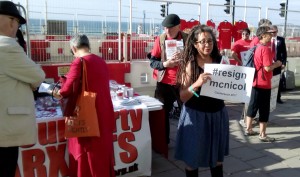
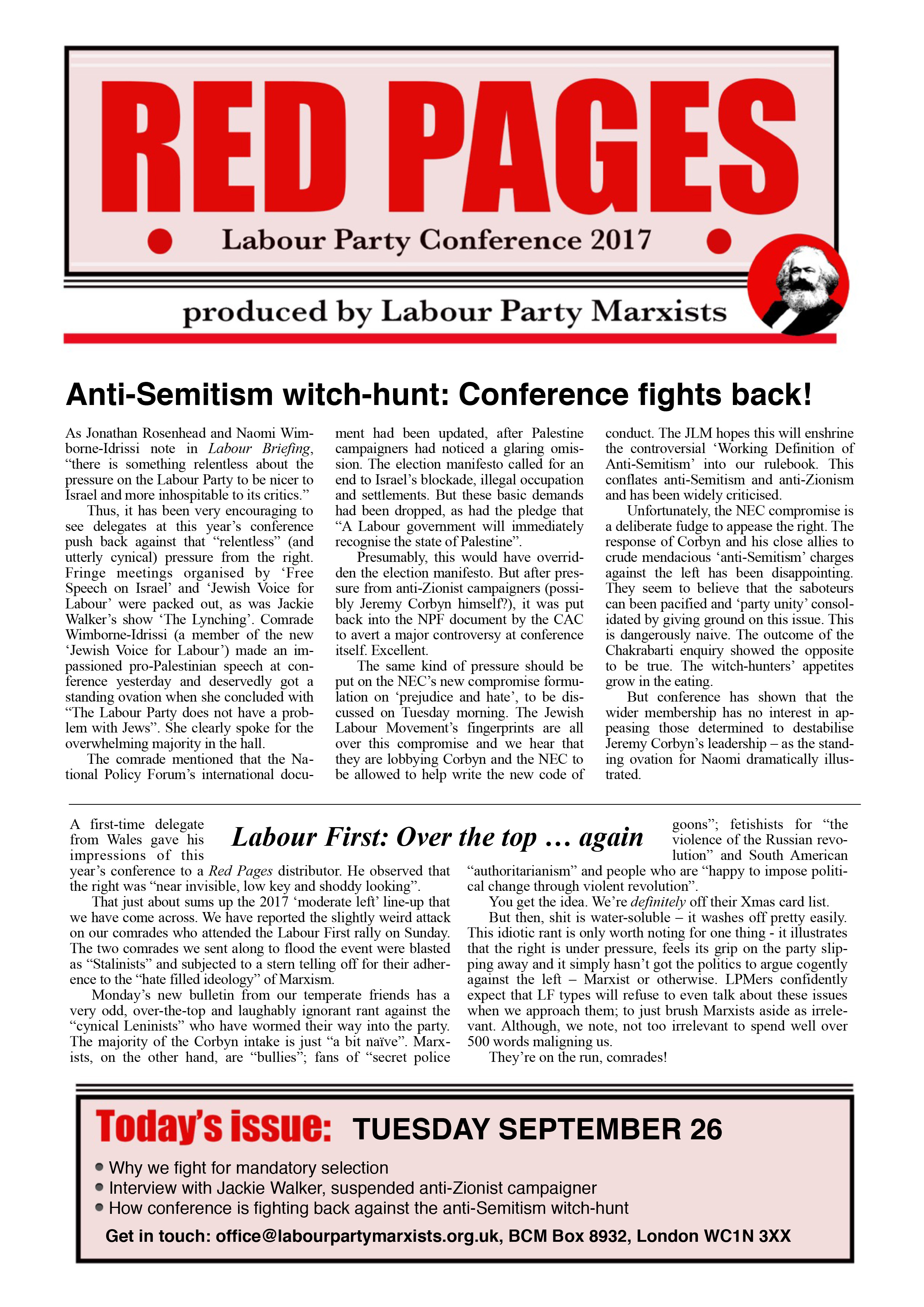
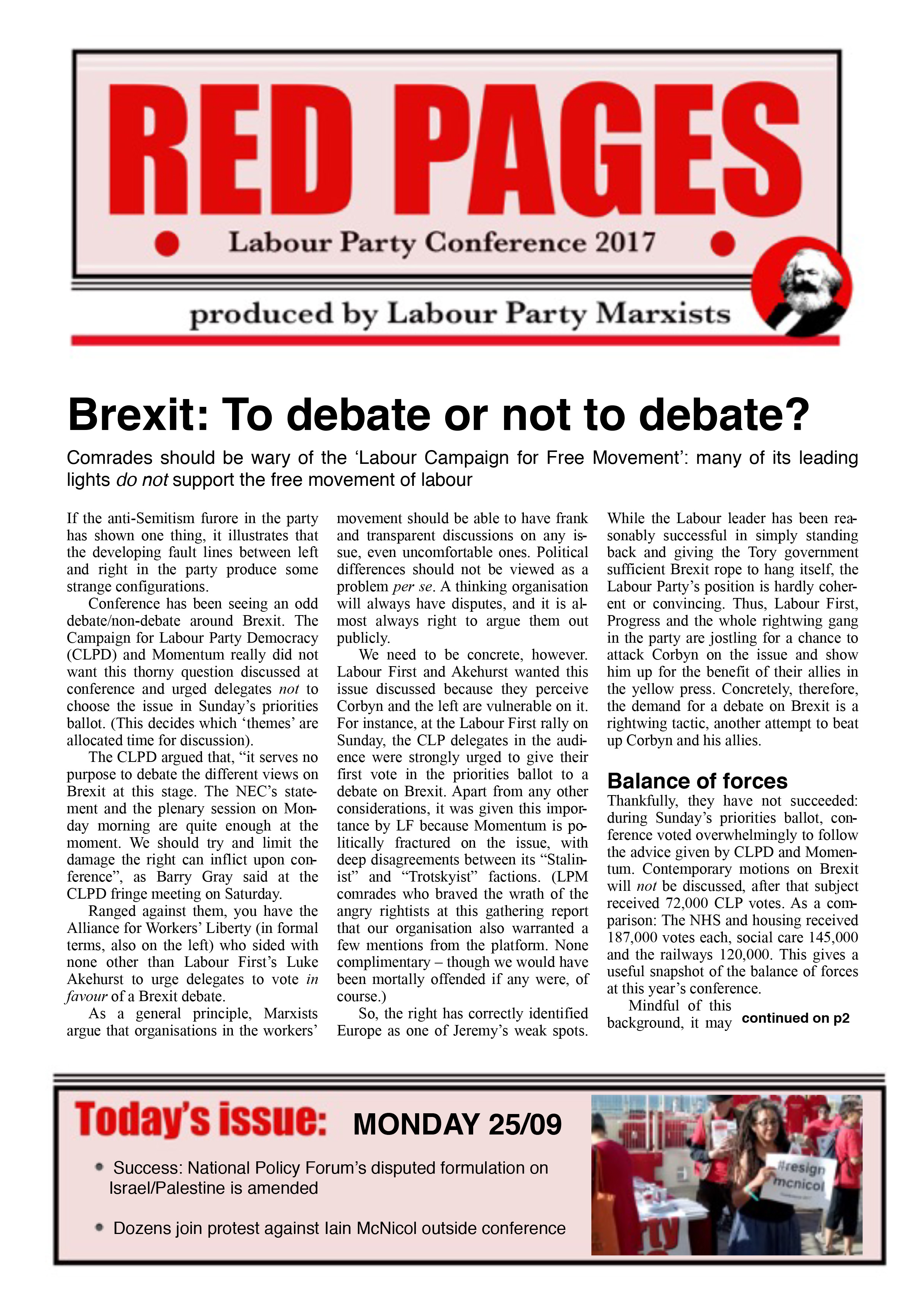
 We need to be concrete, however. Labour First and Akehurst wanted this issue discussed because they perceive Corbyn and the left are vulnerable on it. For instance, at the Labour First rally on Sunday, the CLP delegates in the audience were strongly urged to give their first vote in the priorities ballot to a debate on Brexit. Apart from any other considerations, it was given this importance by LF because Momentum is politically fractured on the issue, with deep disagreements between its “Stalinist” and “Trotskyist” factions. (LPM comrades who braved the wrath of the angry rightists at this gathering report that our organisation also warranted a few mentions from the platform. None complimentary – though we would have been mortally offended if any were, of course.)
We need to be concrete, however. Labour First and Akehurst wanted this issue discussed because they perceive Corbyn and the left are vulnerable on it. For instance, at the Labour First rally on Sunday, the CLP delegates in the audience were strongly urged to give their first vote in the priorities ballot to a debate on Brexit. Apart from any other considerations, it was given this importance by LF because Momentum is politically fractured on the issue, with deep disagreements between its “Stalinist” and “Trotskyist” factions. (LPM comrades who braved the wrath of the angry rightists at this gathering report that our organisation also warranted a few mentions from the platform. None complimentary – though we would have been mortally offended if any were, of course.)
